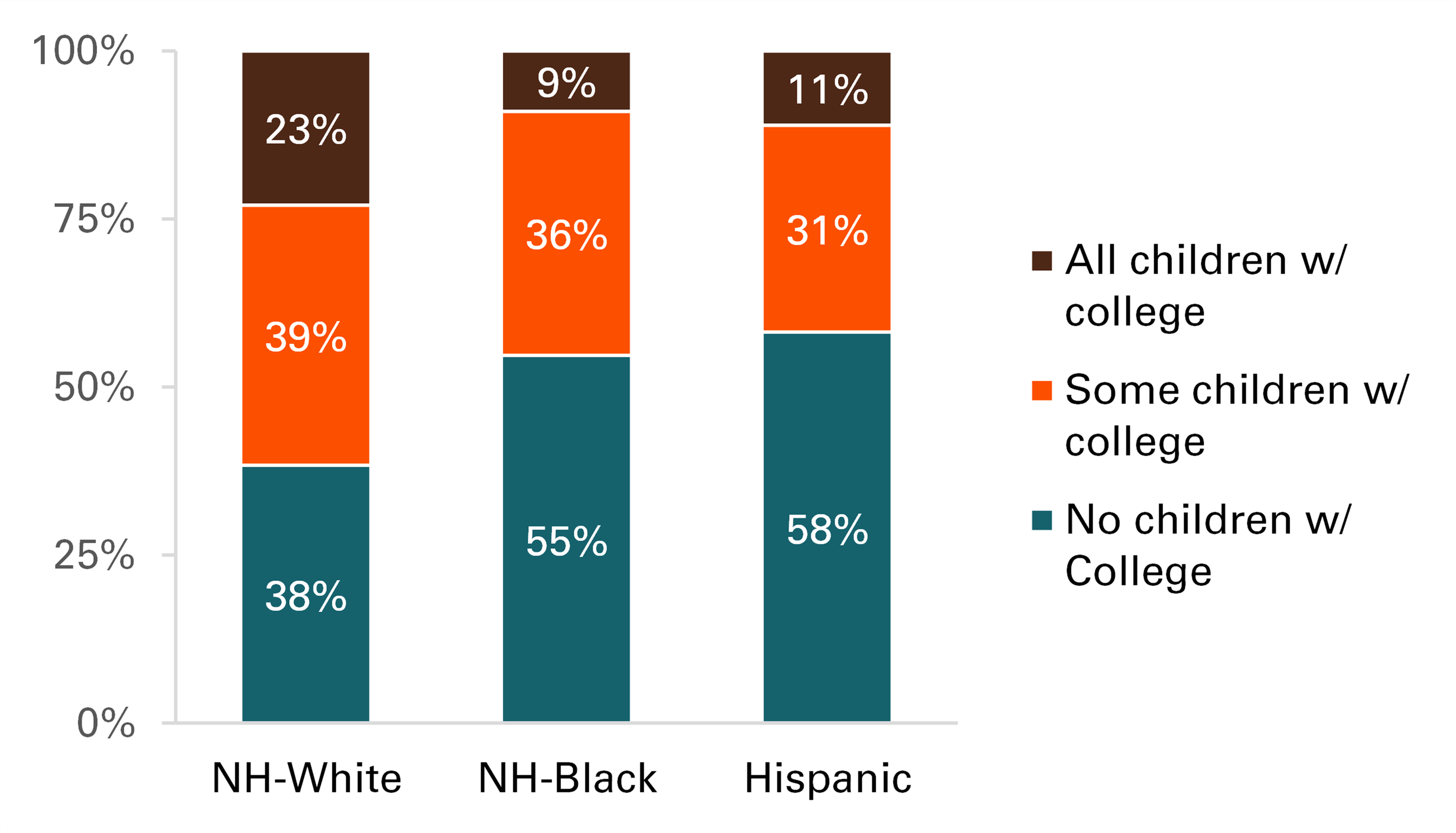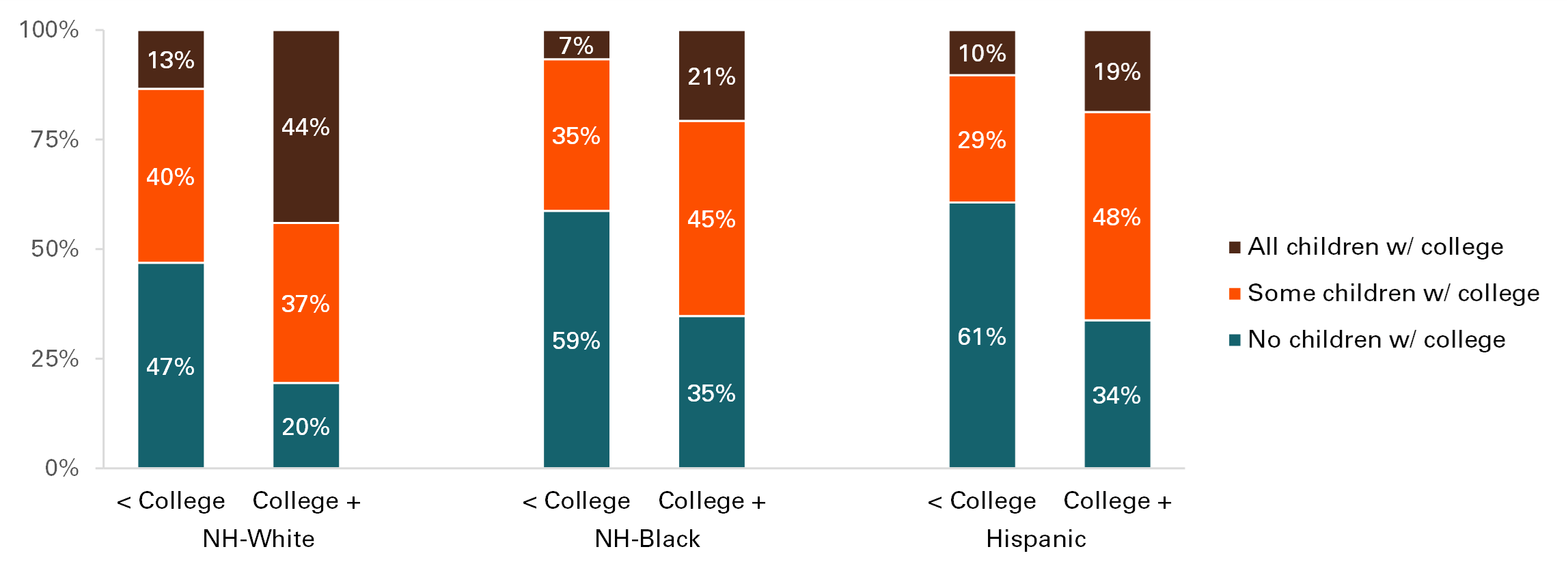Adult Children’s Four-year College Completion by Parent’s Race, Ethnicity, and Educational Attainment
Family Profile No. 12, 2023
Authors: Kellyanne Bunkley, Jaycob Applegate, & Jenjira Yahirun
In the United States, racial disparities in college attainment are well known: Black and Hispanic individuals are less likely than White individuals to attain a four-year college degree or more (Reardon, 2014). Although educational expansion means that more recent birth cohorts have, on average, higher levels of education than earlier birth cohorts, the distribution of educational resources within a family remains less well known. This is important because the benefits of a college education can have ripple effects between generations within the family, as a growing body of work finds important links between children’s education and parents’ health (Friedman and Mare, 2014; Yahirun, Sheehan, and Mossakowski, 2020).
This Family Profile examines the distribution of adult children’s level of education by parental race and ethnicity among parents over the age of 50 in the US. Data come from the RAND Health and Retirement Study (HRS) Family File 2014 (V1) public use dataset and the RAND HRS Longitudinal File 2018 (V2) public use dataset. We consider respondents who were parents of at least one adult child aged 25 or older. Adult children who attained 16 years or more of schooling were assumed to have completed a four-year degree. Adult children’s education reflects the educational attainment of all, some, or no children. Parental educational attainment is also divided into those with and without a college degree. The analysis specifically examines Non-Hispanic (NH) Black, Non-Hispanic (NH) White, and Hispanic parents. All descriptive analyses are weighted.
Adult Children’s College Completion
- The share of adult children with a four-year college education varies across parents of different racial and ethnic backgrounds.
- Among NH White parents, about one in four (23%) reported having children who all attained a college education; this level is more than two-times higher than reported by NH-Black (9%) and Hispanic (11%) parents.
- Among NH White (39%) and NH-Black (36%) parents, a similar share reported having some children who completed college, a slightly higher level than Hispanic respondents (31%).
- Over half of NH-Black (55%) and Hispanic parents (58%) reported having “No children with college,” a greater share than NH Whites, of whom 38% reported having no children with a four-year degree.
Figure 1. Share of Children with a College Degree by Parent’s Race/Ethnicity, 2014

Adult Children’s College Completion by Parent’s Education and Race/Ethnicity
- Across all racial/ethnic groups considered here, adult children more often have a college degree if their parents have earned a college degree, but differentials in these patterns exist according to race/ethnicity.
- Among parents with a college education, NH-White respondents experience more than double the generational advantage of having all their children complete a college education (44%), compared to NH-Black (21%) and Hispanic (19%) parents.
- Conversely, a parental college degree does not necessarily confer an educational advantage. Among parents with a college degree, one in five (20%) of NH-White parents had no children who completed college, compared to more than one-third of NH-Black (35%) and Hispanic (34%) parents.
- Among parents who did not attain a college education, NH-White parents still experience a generational advantage as about half have all or some children complete a college education (40% report Some; 13% report All), compared to about 40% of NH-Black (35% Some and 7% All) and Hispanic (29% Some and 10% All) parents.
- In contrast, among parents with less than a college education themselves, over half of NH-Black (59%) and Hispanic (61%) respondents still experience the generational disadvantage of having no children complete a four-year college education, compared to NH-White (47%) parents.
Figure 2. Share of Children with a College Degree by Parent's Race/Ethnicity and Educational Attainment, 2014

Data Sources:
Health and Retirement Study, (RAND HRS Family Data 2014 (V1)) public use dataset. Produced and distributed by the University of Michigan with funding from the National Institute on Aging (grant number NIA U01AG009740). Ann Arbor, MI, (2018).
Health and Retirement Study, (RAND HRS Longitudinal File 2018 (V2)) public use dataset. Produced and distributed by the University of Michigan with funding from the National Institute on Aging (grant number NIA U01AG009740). Ann Arbor, MI, (2022).
References:
Friedman, E. M., & Mare R. D. (2014). The Schooling of Offspring and the Survival of Parents. Demography 51(4), 1271–93. https://doi.org/10.1007/s13524-014-0303-z.
Reardon, S. (2014). Education. Pathways State of the Union, National Report Card; The Stanford Center on Poverty and Inequality. https://inequality.stanford.edu/sites/default/files/media/_media/pdf/pathways/special_sotu_2014/Pathways_SOTU_2014_Education.pdf
Yahirun, J. J., Sheehan C. M., & Mossakowski K. N. (2020). Depression in Later Life: The Role of Adult Children’s College Education for Older Parents’ Mental Health in the United States edited by D. Carr. The Journals of Gerontology: Series B 75(2), 389–402. https://doi.org/10.1093/geronb/gby135.
Suggested Citation:
Bunkley, K. N., Applegate, J. S., & Yahirun, J. J. (2023). Distribution of children’s college completion by parent’s race, ethnicity, and education. Family Profiles, FP-23-12 Bowling Green, OH: National Center for Family & Marriage Research. https://doi.org/10.25035/ncfmr/fp-23-12
Updated: 11/07/2025 03:09PM

